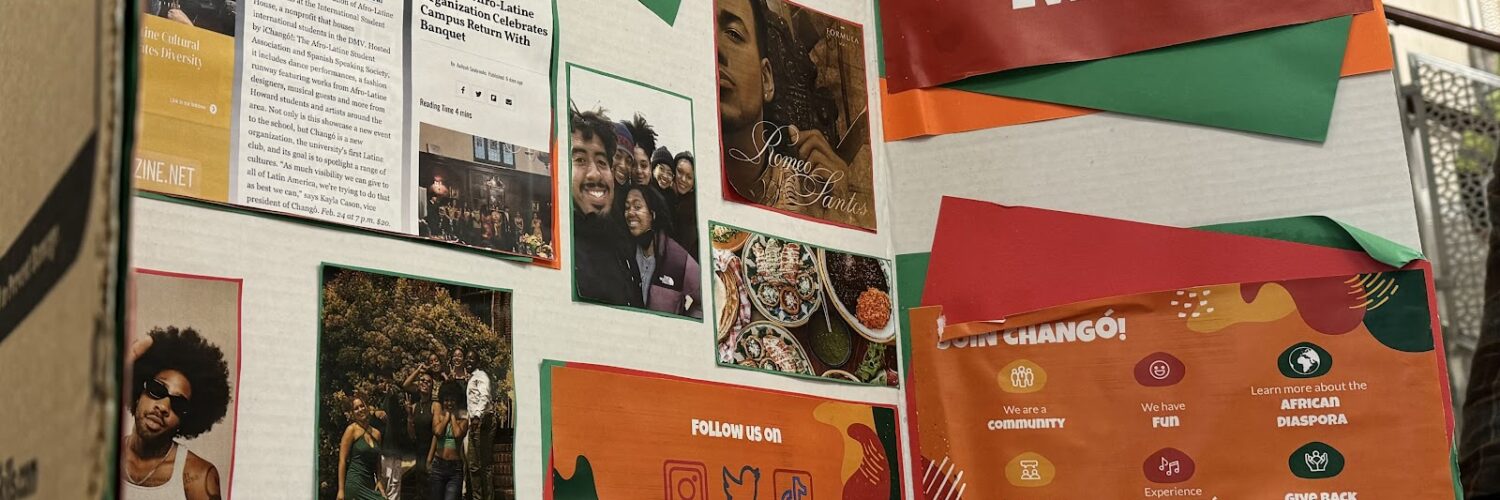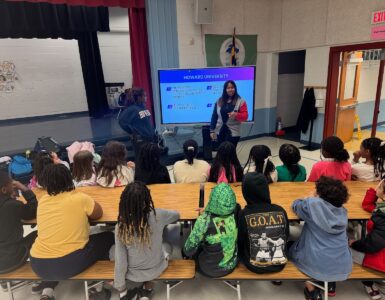
Changó’s Latin Heritage Night poster with cookies on a clothed table in Blackburn University Center. (Anijah Franklin/101 Mag )
On the first floor of Blackburn University Center, salsa music played on a speaker that sat next to a table full of “mantequilla galletas” and “cremas pozuelos” (butter and cream cookies respectively) and a poster board that read “It’s Hispanic Latin Heritage Night!”
As two students salsa-danced in front of the table, others interacted with passing students, sharing their love of Changó, Howard University’s Afro-Latiné Student Association, and Spanish Speaking Society that was founded in 2016.
The association’s reelected president, Kalaya Jones, talked about the group’s decision to alter the nationally recognized title of Hispanic Heritage Month to Latiné Heritage Month–nationally celebrated from Sept. 15 to Oct. 15.

Changó’s president and co-secretary, Kalaya Jones (left) and Amarie Clark (center), salsa dance to Latin music. (Anijah Franklin/101 Mag )
“In the U.S. they use those words interchangeably,” Jones exclaimed. “Hispanic means you’re a descendant from Spain. And a lot of us are not descendants of Spain. A lot of us are from Caribbean countries or South American countries, so we’re Latinos.”
Changing the name under the guise of inclusivity, Jones’ goal along with the association is to ensure representation across the diaspora and have that reflected through their programming. Jones said to be inclusive to all and because the letter x isn’t fit for a replacement since it’s rarely used in the language, their association uses the letter e: Latiné.
Howard’s campus is home to many Black students belonging to the African diaspora, including Afro-Latinos. Since the Afro-Latiné Student Association and Spanish Speaking Society was founded, it has provided a space for students to uplift and educate others about Afro-Latiné culture, proper terminology and intersectionality.

Kalaya Jones (right) talks with two passerby students about Changó. (Anijah Franklin/101 Mag )
Bijou-Elyse Wallace, a sophomore political science, english double major, who is originally from Bayamón, Borinquen or, Puerto Rico—though Bijou uses the spelling ‘Boriquen’—feels it’s important to have organizations that represent people throughout the diaspora, and having one helps her feel less homesick.
“Being able to go to Changó meetings and different events and be able to speak in Spanish, it’s something that I really hold dear to my heart,” she said. “Being able to go and talk to people who have the same experiences, we grew up eating the same food, listening to the same music, it brings me closer to home.”
The association’s meetings and events range from salsa nights, professional development panels, paint and sips and collaborations with organizations like the Howard University African Students’ Association and Howard University Caribbean Students’ Association. Changó also has an official dance team, Rumba Del Valle, and a podcast, Radio Changó.
A co-producer and host of Radio Changó, Chantilly MacFarlan, said she doesn’t consider herself Afro-Latiné but identifies as Puerto Rican and African American.
“My dad is African American and my mom is Puerto Rican,” the senior journalism Spanish minor said.
There are differing opinions on what classifies someone as Afro-Latiné.
“So there’s been a lot of controversy about who, especially I remember like Miles Morales, who is considered to be Afro-Latino. At least the majority of people in Latin American countries, they say that you have to be strictly Latino with African ancestry,” MacFarlan said.

Chango’s Latin Heritage Night poster with the pronunciation of Changó and definition of Afro-Latiné (Anijah Franklin/101 Mag )
MacFarlan pointed to “Dominicans on the island” explaining that they have Black ancestry, in contrast to those who may be mixed in her case.
She talked about how Radio Changó, the podcast, explores many topics, including an episode about Afro-Latiné identity.
“Our purpose is to be the voice for the Latinos on campus. We talk everything surrounding Hispanic and Latino culture, but we center it to Howard,” she said.
Freshman criminology major, Jhanna Rondon said she met MacFarlan at the university’s club and organization fair.
“I’m excited for all the events that we’re planning on having on campus. Because I feel like those are things you can interact more with a lot of people and they get to learn more about Spanish stuff, the culture and traditions and stuff,” she said.
Rondon is one of the nearly 50 freshmen Jones said attended their general interest meeting since Jones is a senior, her time with Changó as an undergraduate student will conclude in the spring.
When she’s gone, she said she hopes her guidance and teachings will prepare the next e-board to maintain the sacred space they’ve created but to grow, connect and inspire more Afro-Latiné spaces.
“I have so much gratitude for this organization,” said Jones. “My big goal I hope to see, maybe accomplish, maybe be a part of it, is [to] have some sort of Afro-Latiné HBCU forum where we get all different Afro-Latiné organizations all around the U.S. that have Afro-Latiné spaces similar to Changó, [and] bring them all together.”










Recent Comments